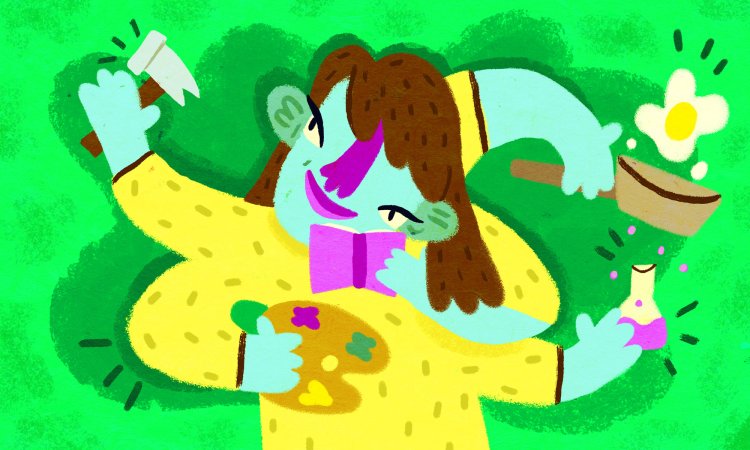
Not all of us are born with one main interest — and we should see that as our biggest strength, not our weakness, says Emilie Wapnick, a writer, coach, artist (and then some).
Do you remember being asked, as a little kid, what you wanted to be when you grew up? When I think back, I don’t remember what I said. But I do remember what happened after I answered: the face of the adult who’d asked took on a look of approval and pride. It felt good to declare an identity.
As we get older, “what do you want to be when you grow up?” goes from being a fun exercise in daydreams to a more serious, more anxiety-inducing question for many of us. We begin to feel the pressure to respond with a practical answer, one with weight and consequences, to which we will be held. The message that we must decide on a single identity is reinforced in many contexts. Mainstream career books and guidance counselors give us tests to help us whittle down our career options to the perfect fit; colleges and universities ask us to declare a major; and employers sometimes ask applicants to explain ourselves when we possess skills in outside fields, implying we lack focus or ability. We’ve all heard of the doctor who always knew she wanted to be a doctor, or the writer who wrote his first novel at the age of 10. These people are held up as shining examples for the rest of us, and — while people like this certainly exist — many of us simply don’t fit into their model.
If so, you are probably a multipotentialite: someone with many interests and creative pursuits. There is no single way to be a multipotentialite. Some of us have a dozen projects on the go at once; others prefer to dive into a single subject for months or years, making it our sole focus until we switch to a new area entirely. Your interests can occur simultaneously (several interests at one time), sequentially (one interest at a time) or anywhere in between.
Be warned: the path to expressing your multipotentialite passions in all their glory is neither straightforward nor smooth. Common obstacles include a lack of career resources and a lack of time to pursue all the things we want to pursue, but the most subtle and often most stifling roadblock for multipotentialites is the self-doubt we sometimes experience. We can be our own worst enemies — we let the fear of being judged keep us stick in careers that no longer serve us and identities that no longer fit. Here are the most pervasive multipotentialite challenges, along with strategies to keep them from holding you back.
Challenge #1: Guilt and shame
It can be crushing to realize you’ve reached your personal endpoint in something you once loved. Perhaps you invested countless hours, sweat, tears and money — maybe you even thought it was The Thing. And when you lose interest, you’re left with a painful realization that you were wrong. I’ve been here many times. I lost interest in music in my early twenties and felt completely lost. Without music, who was I? I experienced similar feelings when my interest in film faded, and when I got bored with law… Going through these emotions, you will worry that you’ve failed yourself and you might feel profoundly lost, guilty and ashamed. You’ll also mourn the good times you had and the passion that is no longer there.
How to address guilt and shame: For starters, remember that shifts in direction make complete sense. Moving on is what multipotentialites do, and remaining in a field out of guilt is like staying in a relationship with someone you no longer love because you’re afraid of hurting them. Unlike in a relationship, the only person you’re hurting here is yourself. (That’s not completely true — you’re also hurting the people you could touch in your next endeavor by depriving them of your ideas, skills and presence.) Know, too, that there’s more excitement to come. Letting something go frees you up so that you can move on to your next adventure. There, you will acquire new skills, and you’ll take these skills with you into every new realm you explore. And you’ll meet all kinds of amazing people because you didn’t let yourself remain stuck in a field you’ve outgrown. Finally, you are not what you do. You are not your medium. You are not your job. You are bigger than “musician” or “teacher” or “electrical engineer.” You are whole, regardless of your title (or even without one at all). As you become more comfortable with your mutable nature, you’ll start to see transitions as exciting and necessary rather than as identity-crushing events. You’ll realize that everything you’ve experienced, created and learned is still with you, fortifying your ability to enter new realms with a more complex and nuanced perspective.
Challenge #2: The discomfort of being a beginner again and again
Beginnerdom pretty much comes with the territory of wanting to do and be many different things. Many multipotentialites love learning, but even the most self-assured among us can feel vulnerable and uncomfortable in the early stages of a new pursuit.
How to address beginnerdom: Being bad at something is a necessary part of the process of becoming good (and then great) at it. That might seem obvious, but it’s easy to forget that incompetence is a required step. It’s so simple to prematurely declare yourself to be “bad at drawing” or “bad at science.” Give yourself some time. As you progress, keep track of your small wins. Whenever you grasp a concept or make even a modicum of improvement, write it down in a journal. This will lift your spirits and keep you motivated so that you can continue learning. Don’t overwhelm yourself. Instead, schedule it so you work for shorter increments, more frequently. It will help new information sink in your brain and muscle memory faster. Shorter work periods also prevent you from getting too frustrated. When my dog was a puppy, she very much wanted to respond to my commands, but her brain couldn’t figure out what “down” and “stay” meant. If we worked on training for too long, she’d become frustrated and give up. So we worked in five- to ten-minute increments, once or twice a day (with plenty of treats), and eventually she got it. Last but not least, be kind to yourself. Another lesson I learned from dog training: positive reinforcement is far more effective than scolding. Treat yourself like a confused but well-meaning little creature. Be gentle, be patient, and eat a cookie from time to time.
Challenge #3: Fear of not being the best
One of the most common concerns for multipotentialites is that we won’t measure up to specialists who have been working in a field for decades. Our inner voice says things like, “Why would someone hire me, a former chef, as a project manager when they could hire someone who has been in the industry for years?” or “Why would anyone want to work with a health practitioner who is also a professional dancer, when they could find a doctor who has been obsessed with medicine since the age of five?”
How to address the fear of not being the best: It’s impossible to actually be the best. Even if you dedicate your life to one discipline, you will likely never reach number one. There will always be someone more skilled and someone less skilled than you — that’s just life. Pursuing something with the goal of being better than everyone else pits you against other people and creates an atmosphere where you’re constantly comparing yourself to others and judging yourself. And here’s another little secret: there’s no National Guild of Experts out there, giving out badges to the true masters and exposing the amateurs as fakes. You’re an expert until someone says otherwise — and they usually don’t. Most potential employers and clients are looking for people who understand their particular problem and can provide them with solutions. If you present yourself with confidence and link your skills to concrete results, the right people will want to work with you.
Challenge #4: Imposter syndrome
Imposter syndrome is the belief that deep down, you are a fraud, that you shouldn’t be here, and that one day everyone will wake up and realize it. The funny thing about it is it tends to get worse, not better, as bigger opportunities and successes come our way.
How to address imposter syndrome: If you were actually an imposter, you wouldn’t get imposter syndrome. Imposters are liars, bent on tricking others and profiting from that deceit. That’s not you. You’re just trying to do good work, and the effort to create something new sometimes always inspires uncertainty. If you occasionally doubt yourself, take it as a sign that you’re one of the good ones. Every well-meaning person who is pursuing something that matters to them feels as though they don’t belong some of the time.
Challenge #5: Facing your external critics
Multipotentialite insecurities don’t always originate from within. Our anxieties could come about in reaction to an outside voice: a concerned parent, a confused colleague, an arrogant teacher. Every multipotentialite knows how it feels to share a new interest with someone and receive a blank stare or look of disapproval.
How to address external critics: It’s said that an individual is the product of her five closest friends. The people we choose to surround ourselves with profoundly impact our motivation, our goals, and what we believe is possible. Don’t be afraid to step away from friendships and seek out new friends who have lifestyles and beliefs that are more aligned with the direction you want to move in. You aren’t obligated to hang out with anybody you don’t want to hang out with, especially people who are critical of your life choices or are negative in general. After you’ve ditched the doubters, it’s time to seek out a supportive community. Get out there, start pursuing the areas that fascinate you, and find your people.
On a bad day, it’s easy to think that it would be nice to explore our many interests in private. However, secluding ourselves and relegating our multipotentiality to the private sphere would be a disservice to us and to everyone else. Being an “out and proud” multipotentialite means interacting with the world, learning to talk about our work, and listening to our hearts in the face of fear or disapproval. It’s not always easy or comfortable to show up as our whole selves. But take a risk. Show the world how awesome you are, and help lessen the stigma around doing many things. You’ll feel better, and you’ll make it easier for other multipotentialites to be who they are. Doing it, together, is how we build a movement.
Excerpted from the new book How to Be Everything: A Guide for Those Who (Still) Don’t Know What They Want to Be When They Grow Up by Emilie Wapnick. Reprinted with permission from HarperOne, an imprint of HarperCollins Publishers. © 2017 Emilie Wapnick.











